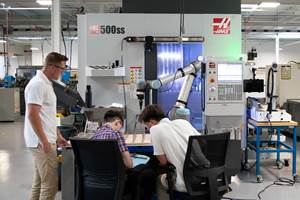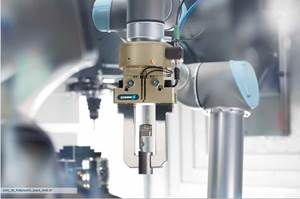Video: 5 Questions about Automation in Manufacturing
Productive uses of automation often involve people and technology working in parallel to complement one another.
Share





Video Transcription
What is Automation?
Automation in manufacturing is a means to keep the process meaning from step to step from cycle to cycle without a human being having to intervene. We hear automation and we think…robots? Manufacturers are using significantly more robots, but five axis machining is also automation. Also, bar feeds, indexers, software tools that streamline planning and programming are animation as well.
Is Automation replacing people?
Rarely would an employer say, “I can’t find someone to fill this job, therefore I’m going to automate”. One is not a replacement for the other. Manufacturers use automation to bridge gaps in which employees don’t produce. An example is a line or a cell that keeps on running into the night after the employees have gone home. Another is a highly repetitive automated process that keeps on running so that the employees can turn away from it, walk away from it here and there to tend to other tasks. The employer that learns to succeed with automation this way, using it to leverage what the employees can do, often is able to expand production without expanding staff. But, at the same time, many employers have added staff after automating because the multiplying effect of the automation makes each incremental employee that much valuable.
Is unattended production the only reason to use automation?
Beyond unattended production another reason to use automation is repeatability. A process that is more consistent from cut to cut or from piece to piece.
Another reason to automate, predictability. Know precisely how many parts you’re going to produce within a given period-of-time. Also, safety even comfort. Some operations, maybe some polishing or deburring operations are either hazardous enough or tedious enough that it’s difficult to have an employee do them.
Why are manufacturers adopting automation now?
The move to greater use of automation is one of the most important trends in shaping manufacturing. Today automation is accessible for two reasons. One, technology. Automated systems are easier to program, easier to install and use than every before. Two, manufacturers are ready for automation. An automated device needs a defined system to plug into. In the last generation or so manufacturers have made considerable advances at defining and structuring their processes. A process that is better understood is a better candidate for automation.
What is the future of automation?
The future is enterprise level automation. When you hear data driven manufacturing, Industry 4.0 that’s automation, but it’s not automation of moving parts or sequences of operations. Its automation of decisions related to scheduling, ordering, maintenance. We’re not there yet, but we’re getting better at data gathering. We’re getting better at sharing data across supply chains. Eventually, the promise of this is going to be processes and plants that are able to keep on producing effectively without waiting for human beings to make decisions even at some of the higher levels.
Learn More by visit the Robots & Automation Zone.
Related Content
Setting Up the Building Blocks for a Digital Factory
Woodward Inc. spent over a year developing an API to connect machines to its digital factory. Caron Engineering’s MiConnect has cut most of this process while also granting the shop greater access to machine information.
Read MoreCNC Machine Shop Honored for Automation, Machine Monitoring
From cobots to machine monitoring, this Top Shop honoree shows that machining technology is about more than the machine tool.
Read MoreLean Approach to Automated Machine Tending Delivers Quicker Paths to Success
Almost any shop can automate at least some of its production, even in low-volume, high-mix applications. The key to getting started is finding the simplest solutions that fit your requirements. It helps to work with an automation partner that understands your needs.
Read MoreStuder's Automation, Entry-Level Solutions Take Center Stage
At its 2024 Music Motion Meeting, Studer AG showed off its entry-level line of grinding machines, as well as its newest universal loading system.
Read MoreRead Next
Machine Shop MBA
Making Chips and Modern Machine Shop are teaming up for a new podcast series called Machine Shop MBA—designed to help manufacturers measure their success against the industry’s best. Through the lens of the Top Shops benchmarking program, the series explores the KPIs that set high-performing shops apart, from machine utilization and first-pass yield to employee engagement and revenue per employee.
Read MoreAMRs Are Moving Into Manufacturing: 4 Considerations for Implementation
AMRs can provide a flexible, easy-to-use automation platform so long as manufacturers choose a suitable task and prepare their facilities.
Read More





















